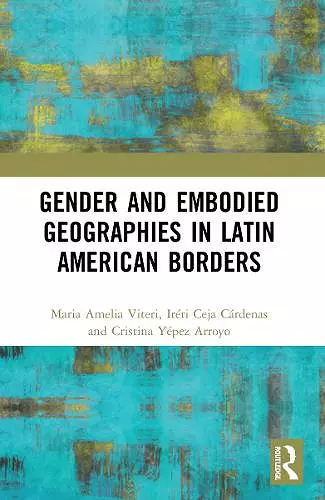Gender and Embodied Geographies in Latin American Borders
Maria Amelia Viteri author Iréri Ceja author Cristina Yépez Arroyo author
Format:Paperback
Publisher:Taylor & Francis Ltd
Published:25th Sep '23
Currently unavailable, and unfortunately no date known when it will be back
This paperback is available in another edition too:
- Hardback£145.00(9781032123554)

Gender and Embodied Geographies in Latin American Borders is the first study of its kind to bring a gender perspective to studies on violence and "illegal markets" in the region.
Analyzing the structural problems that create inequality and enable gendered violence in Mexico, Guatemala, Colombia, Ecuador, Peru, Bolivia, Brazil and Argentina, the authors offer a critique of the securitization of borders and the criminalization of human mobility, and propose alternatives to reduce violence. Newspaper reports on gender and the variables of violence, human trafficking, people smuggling, missing persons, victims and perpetrators uncover the production and reproduction of discourses and images related to violence. Interviews with strategic actors from nongovernmental organizations, academia, as well as public policy makers diversify the experiences from the different voices of authority.
Gender and Embodied Geographies in Latin American Borders encourages us to continue to question silence, impunity, the restriction of mobility, the dehumanization of securitization policies and the institutionalization of gender violence. A welcomed must read for scholars, researchers, policy makers, and students of gender studies, security studies and migration.
"This essential book about border crossings and border violence, by putting gender and its structural violence at the center, helps us to think beyond simplistic descriptions and conventional solutions, such as border security measures. We gain new insights into labor exploitation, illegal markets from mining to sexual exploitation, and the complicity of states. And new solutions that support rather than criminalize. A must read for all of us."
Lisa Rofel, Professor Emeritus and Research Professor, Department of Anthropology, Co-Director, Center for Emerging Worlds, University of California, Santa Cruz
"Gender and Embodied Geographies in Latin American Borders is an impressively documented book that deals with different forms of gendered violence, amplified by border systems in eight countries. By using a combination of quantitative and qualitative sources, authors analyze how the political economy of the global border system creates opportunities for illegal, illicit, and informal forms of transactions that end up producing particular "corpografías", or worlds of existence, marked by specific bodily trajectories and structural violence.
Montserrat Sagot, Full Professor, Universidad de Costa Rica
"This slender volume examines gender issues with a focus on global border areas in Latin America. Topics considered include human mobility (smuggling, trafficking, border security, crime organizations), embodied geographies (femicide, trans women, structural violence), and legal and illegal markets (labor exploitation, corruption, human rights violations). An additional chapter further complicates the situation by considering women's various involvement in illegal markets and border zones. To research these issues, the authors and their collaborators conducted a predominantly qualitative analysis of newspaper articles from Mexico, Guatemala, Colombia, Ecuador, Peru, Bolivia, Brazil, and Argentina spanning 2000 to 2015. This textual analysis was supplemented by interviews with country experts along with findings from academic literature dating to 2016. The book ends with three additional chapters on visual and textual representations of death; summary findings; and policy recommendations concerning border security, human mobility, gendered body geographies, markets and exploitation, and media representations. The authors note the limitation of their sources (e.g., what does and does not appear in newspapers). This book is therefore best for policymakers and academics who are knowledgeable in this area and can supplement these insights with materials from other sources.
Summing Up: Recommended. Graduate students, faculty, and professionals.
C. Hendrickson, Emerita, Marlboro College (now part of Emerson College)
"This essential book about border crossings and border violence, by putting gender and its structural violence at the center, helps us to think beyond simplistic descriptions and conventional solutions, such as border security measures. We gain new insights into labor exploitation, illegal markets from mining to sexual exploitation, and the complicity of states. And new solutions that support rather than criminalize. A must read for all of us."
Lisa Rofel, Professor Emeritus and Research Professor, Department of Anthropology, Co-Director, Center for Emerging Worlds, University of California, Santa Cruz
"Gender and Embodied Geographies in Latin American Borders is an impressively documented book that deals with different forms of gendered violence, amplified by border systems in eight countries. By using a combination of quantitative and qualitative sources, authors analyze how the political economy of the global border system creates opportunities for illegal, illicit, and informal forms of transactions that end up producing particular "corpografías", or worlds of existence, marked by specific bodily trajectories and structural violence.
Montserrat Sagot, Full Professor, Universidad de Costa Rica
ISBN: 9781032123585
Dimensions: unknown
Weight: 320g
156 pages